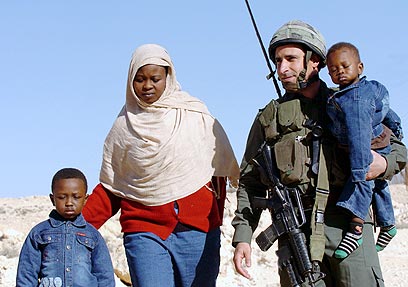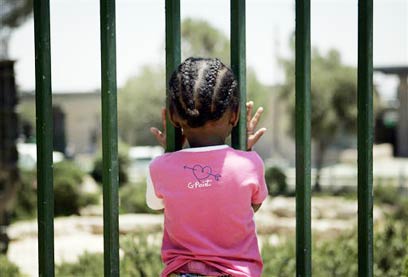
Exodus: Sudan
Prime minister’s wife sets out to trace journey of refugees pouring across Egyptian border into Israel. ‘I come home with the sense of urgency of someone who has been burned by what her eyes have seen,’ she writes, but knows there is no easy solution
I have met in the past with representatives from various human rights groups in Israel and the Jewish world, from the United Nations and HIAS (an international Jewish organization for refugees), experts on refugee rights, state officials, volunteers, philantrapists, officials from the military, the police and the immigration authority, spokesmen for Yad Vashem alongside illegal residents, economic migrants and genocide refugees – all that expertise only gave birth to a grim picture regarding the future of the infiltrators and a country which is finding it difficult to cope with them.
There are those who warn of some 3 million illegal residents in Egypt getting ready to come to Israel.
A desperate want for safety
A payment of $1,500 for a man and $750 for the woman will get you across the border, from Cairo to Philadelphi. There is no room for gaps in the convoy leading this modern exodus from Egypt. An AK-47 assault rifle is there to make sure no one straggles behind and delays the group. The Bedouin’s meter is running. He’s got another group after you.You’re certainly not the first who hopes to swap a $50 a month salary in Cairo for a $1,000 one in Eilat.
The journey lasts several nights and the Egyptian border defense is ahead of you. Don’t worry about it though. They told you that the Bedouin has an arrangement with the commander of this region. There’s proof it’s worked in the past, even back then when business was different, when smuggling was limited to tobacco products, drugs and prostitutes.
When you get to the Egyptian border they will fire a few warning shots in the distance. Don’t worry about it; it’s just a little commotion as you cross the wire fence. Then dash across the few meters between the Third World and a country party to the refugee treaty. A few more steps and you’ve crossed into ‘The Land of Peace’ – as the Eritrean refugee caught last night by IDF forces called it.
Now all you have left to do is wait. The IDF vehicle has already been alerted to the scene ever since the border cameras picked up signs of suspicious movement. The Israeli soldier who will determine that you are not smuggling arms will then give you a drink of water and hold your baby while you clamber onto your ride to the Gozal encampment.
Camp Gozal. I don’t know what they were thinking when they named a few dusty prefabricated structures after a baby chick. Certainly they never dreamt its storage houses would be stocked with diapers, pacifiers and boxes upon boxes of formula. But the name was given a long time ago, back when Sudanese babies were only something we’d see on the cover of National Geographic.

A payment of $750 for a woman to cross the border (Photo: AFP)
The soldiers entrusted with guarding this stretch of the border aren’t prepared for hosting duties. Certainly not for people so weary and tired they can’t seem to even look at you. The country lacks the billions needed to fence the Philadelphi route. The porous borders of a developed country are an impossible temptation and a solider tending to refugees is distracted from his original mission.
Those caught tonight stretch out on the floor of an office cleared of its furniture, makeshift partitions divide between a group of laborers from Eritrea to a family – father, mother and two children – who escaped the genocide in Darfur.
The sharp odor of sweat permeates the room. It’s hot, stuffy and frightening. The family covers itself in military blankets. The father’s feet stick out, his soles scarred. His beautiful wife sits beside him and holds the girl, the boy wheezes in his sleep. The father tells me in English of the Janjaweed who burned their village. Of the family members who perished there.

The Israeli soldier will determine your fate (Photo: Meir Azoulai)
He hands me a yellow certificate issued in Egypt and stares up at the ceiling. “Just a place. A prison cell. One tiny, tiny cell would be enough for the whole family. I have no place to go, just a place…” the sight of a strong, lost man weeping affects everyone. It’s hard to face such a condensed synopsis of the life of a refugee – shattered past, murky present and a future dependent on the mercy of a steadily approaching screening process.
The fate of the family we met will be decided by a UN expert. He is the one charged with verifying their story, with determining whether they are deserving of a refugee status. Only several hundred of the 2,095 illegals in Israel will be eligible for the humanitarian gestures promised in the treaty Israel is party to. The vast majority of these are those who fled Darfur. Migrants seeking better living conditions will, apparently, be sent elsewhere.
Humanitarian drawings
We drive to Ketziot base. In section 15 a group of 108 men are being held. We can’t go in to these sectors. The wives and children of these men are being housed in shelters for battered women and the poor. That’s all there is for now.
Who can explain the difference between the Sudanese man who is working for his living in a hotel in Eilat and the ones held in section 15? Timing maybe? Luck? The Supreme Court is slowly releasing infiltrators with no criminal record. And if they are released, where will they go? Crime? Illegal employment? The gangs of unemployed men at Tel Aviv’s central bus station?
From the point of view of someone who has escaped genocide, rest beneath a plastic mesh canopy is wonderful. It’s not very hard to be seen as humanitarian by someone who has seen true horror.
It’s unclear if imprisoning the infiltrators in an encampment adjacent to a military prison will stem the flow of those seeking refuge in Israel. It certainly will not deter those fleeing genocide.
When it comes to solutions for large-scale problems, everyone looks to the security services. The assumption is that only they can relocate a population from spot A to spot B.
And again the army will unload a jeep with freed refugees in the Beersheba marketplace. Again heated arguments between local municipalities asking each other who the hell these people are and where they belong. Another demonstration in Jerusalem, refugees are taken from the hotel to dormitories in Evim else and back again. Again students for social work will come to fill the void left by the State.
The mercy we can give these broken people is to quickly identify those who are eligble for refugee status and speed along their absorption in Israel. As for the wave of economic migrants, we cannot handle it - we must be compassionate, but also firm. What we must not do is send them packing back to Egypt without receiving assurances that they will be treated fairly.

A modern exodus. Mother and child in the Rose Garden, Jerusalem (Photo: amir Cohen)
We must also remember that sending a Sudanese back to Sudan after he has visited Israel, an enemy nation, is tantamount to a death sentence. That must not be ignored and alternatives must be found.
‘I love Israel’
My journey ends with a group of refugees invited for a day of fun at the pool in Kibbutz Kfar Aza. We cross the Negev westward, pass by hitchhiking posts with graffiti proclaiming - Kahane (the leader of the extreme right-wing Kach party) was right.
Kfar Aza. Another border fence. This time with the Palestinian Authority. On the right manicured houses bathed in green, on the left – a plowed field and in the distance the first row of Gazan houses. On the roadside there’s an abandoned military half-track from a war long ago, out of its center rises an olive tree.
The pool in the kibbutz is a madhouse, but volunteers are cheerful and friendly. The group, 58 Sudanese refugees, climbs out of the pool and slip into cotton T-shirts with ‘I Love Israel’ emblazed on their back. They smile as they settle into the white plastic beach chairs.
Silence. Maybe they’re expecting something. Go figure what they must be thinking, meeting the prime minister’s wife. What tools they think are at my disposal to move things. Tomorrow the 10 days they were allotted by Evim will be up. They don’t know where they will wake up tomorrow. Neither do I.
Should I greet them with ‘Welcome’? Share my fears about what will happen. I listen to their repeated requests for refuge and am careful from any statements that may sound as a promise. A young teenager whose father was imprisoned in Egypt and whose mother disappeared there tends to his two younger brothers, he asks what will happen.
Africa’s disaster
I come home laden with letters of request and the sense of urgency of someone who has been burned by what her eyes have seen. The world is separated into those who have met refugees face-to-face and those who are only vaguely aware of them.

'We must be compassionate' (Photo: AP)
The radio reports of several shock victims from another Qassam in Sderot, the Syrian threat, fortifying the north – the voice of a nation struggling for its existence, now that nation is being forced to deal with the disaster in Africa.
Moshe the driver says that we need “a firm hand” when it comes to the smuggling industry. If there aren’t any smugglers, he says, there won’t be any infiltrators. No Sudanese, no economic migrants, no Eritrean laborers… all those descriptions we heard today.
Maybe he’s right, Moshe the driver. Who knows?










